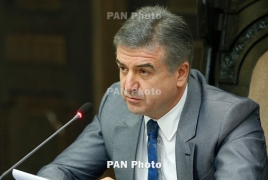Armenia PM: Govt. proposes most rapid economic change possible November 21, 2016 - 17:08 AMT PanARMENIAN.Net - Armenia’s Prime Minister Karen Karapetyan said on Saturday, November 19 that the country needs “profound change," adding that “we’re proposing the most rapid change that’s possible,” including measures to combat corruption by streamlining bureaucracy and a government fund to support enterprise, Bloomberg reports. “Businesses shouldn’t be obstructed" by corrupt officials seeking payments for administrative decisions or by dominant rivals using political ties to restrict competition, said Karapetyan, a former mayor of Yerevan who took office after returning from Russia, where he worked in Moscow since 2012 for a subsidiary of Gazprom PJSC, the world’s largest natural-gas exporter. “We will create an even, competitive, level playing field." Armenia’s foreign debt is $5.8 billion with GDP at $10 billion, while growth of 3.2% in 2017 won’t be enough to raise living standards significantly, Karapetyan said. “We also have external debt growing faster than the GDP growth and growing faster than revenues," he said. Changes in the leadership of the customs service and in the tax code are improving transparency, and he won’t allow dominant players to use “administrative support that isn’t available to others" to suppress competition, Karapetyan said. “No one is immune and no one is privileged,’’ he said. Armenia rejected a trade pact with the European Union to enter the Russian-led Eurasian Economic Union of former Soviet states in January last year. While critics say there’s been no economic benefit so far, nobody knows what would have happened if Armenia hadn’t joined and “the negative impact could have been much greater," while membership doesn’t stop Armenia developing EU trade, Karapetyan said. Armenia’s also seeking to bolster trade with Iran following the lifting of international sanctions over the Islamic Republic’s nuclear program. Karapetyan said he’s ordered plans developed by December 25 to implement a free economic zone near Armenia’s southern border to boost ties in areas including agriculture and food production. Armenia’s in a "challenging" position after absorbing “tremendous shocks" when Russia’s ruble devalued following the fall in oil prices, Teresa Daban Sanchez, the International Monetary Fund’s resident representative in Yerevan, said in an interview. Karapetyan further said that “we clearly understand that reduced public spending may have a downside effect," while businesses are delaying investment until after the elections. Amid speculation he’s a short-term appointment to improve the ruling Republican party’s prospects, it’s “inappropriate’’ to say if he’ll be prime minister after the vote because nobody can predict the outcome, he said. Even so, he’s seeking to develop clear long-term plans over the next six months so that “from 2018 we’ll have sustainable year-on-year growth,’’ Karapetyan said. Yerevan has dismissed Turkey’s demand to shut down the Armenian nuclear power plant as “inappropriate”. Armenia will loan 2.9 billion drams to Nagorno Karabakh (Artsakh), according to a draft government decision. The Ministry of Ecology and Natural Resources of Azerbaijan has “strongly condemned” Armenia’s decision. Kerobyan has said that for the first time in the history of Armenia, the volume of foreign direct investments amounted to about $1 billion. Partner news |